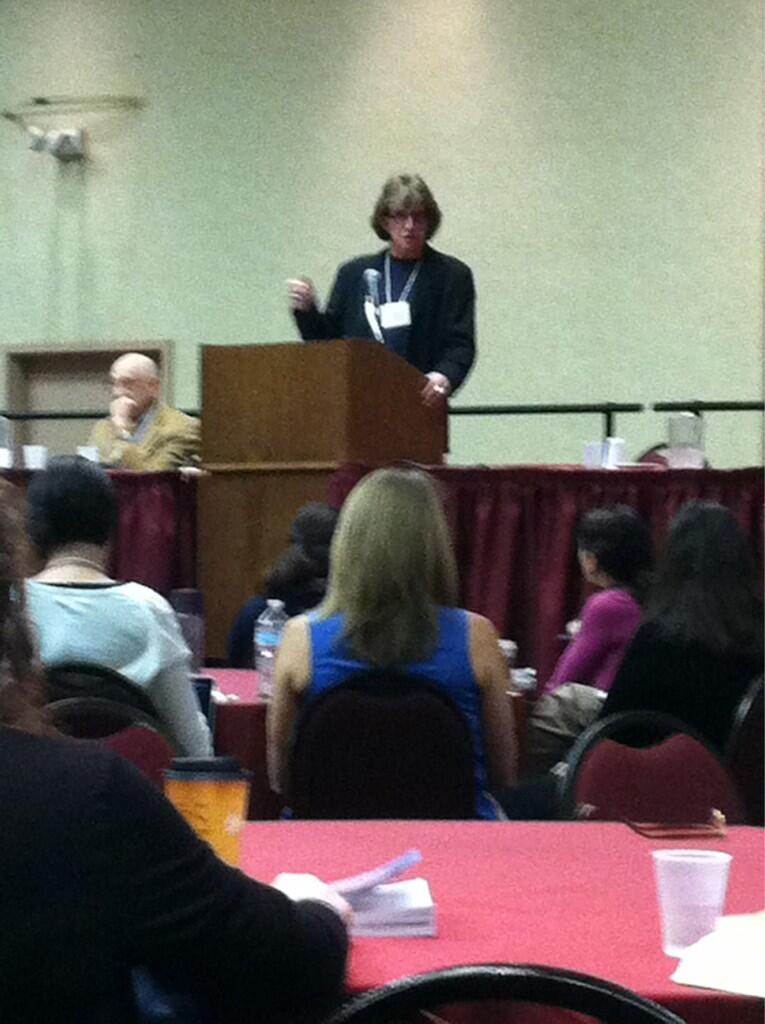On Friday morning, I saw Henry Giroux speak as a featured speaker at the CCC 2013. I regret not taking close notes although I posted the picture below on Twitter and I received a message back from former Tucson Ethnic Studies teacher Curtis Acosta. Acosta asked me to send abrazos in thanks to Giroux for the piece he wrote on the Tucson Ethnic Studies MAS program. So after Giroux finished his lecture, I took the moment to pass along the message of thanks. He smiled and said that he loved that piece.
(Henry Giroux at CCC 2013)
FRIDAY, MARCH 15: 9:30-10:45 a.m.
Chair: Donald Lazere, Cal Poly State Univer
This session will examine how the ideal of higher education as a public good is losing its claim to legitimacy in a society that increasingly defines market interests as the sole measure of individual and social value and teaching largely as a measurable and instrumental task. Against this view of higher education as an adjunct of business culture, this talk argues for educators to take on the role of public intellectuals willing to engage in creating a formative culture of learning capable of nurturing the capacities to defend higher education as a public good crucial to sustaining a critical citizenry and a democratic society. In the current historical moment, higher education as a democratic public good faces a crisis of enormous proportions. At the center of this crisis, particularly in the United States, is a tension between democratic values and market values, between dialogic engagement and a creeping authoritarianism. Faith in social amelioration and a sustainable future appears to be in short supply as market fundamentalism performs the dual task of using education almost exclusively to train workers for service sector jobs and produce life long consumers. This talk will examine the responsibility of academics in dark times, and what it might mean for scholars not only to redefine the meaning of higher education as a public value, but also the promise of academics and critical pedagogy as crucial to developing the formative culture that make a democracy possible. Central to such a challenge is the necessity to define intellectual practice “as part of an intricate web of morality, rigor and responsibility” that enables academics to speak with conviction, enter the public sphere in order to address important social problems, and demonstrate alternative models for what it means to bridge the gap between higher education and the broader society. This is a notion of intellectual practice that refuses both the narrow instrumentality and privileged isolation of the academy, while affirming a broader vision of learning that links knowledge to the power of self-definition and the critical capacities of administrators, academics, and students to expand the scope of democratic freedoms, particularly as they address the crisis of higher education as part and parcel of the crisis of democracy itself .
Henry Giroux is Global Television Network Chair In Communication Studies
and a member of the English and Cultural Studies Dept.at McMaster University in Hamilton, Ontario. A prolific author, Professor Giroux has been an extremely articulate and passionate advocate for progressive education and has mounted a spirited defense of public education in a time of intense privatization.

No comments:
Post a Comment